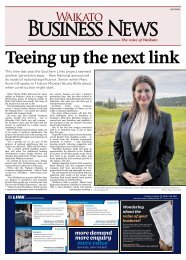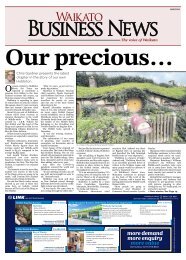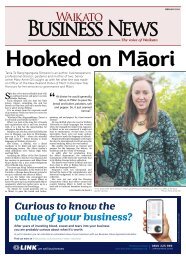Waikato Business News January/February 2017
Waikato Business News has for a quarter of a century been the voice of the region’s business community, a business community with a very real commitment to innovation and an ethos of co-operation.
Waikato Business News has for a quarter of a century been the
voice of the region’s business community, a business community
with a very real commitment to innovation and an ethos of
co-operation.
Create successful ePaper yourself
Turn your PDF publications into a flip-book with our unique Google optimized e-Paper software.
WAIKATO BUSINESS NEWS <strong>January</strong>/<strong>February</strong> <strong>2017</strong> 3<br />
Housing push sparks<br />
concern about pressure<br />
on builders<br />
Hamilton’s already booming building scene<br />
is about to be put on steroids as Hamilton<br />
City Council actively ramps up its dwelling<br />
and section consent targets for the next<br />
three years.<br />
By GEOFF TAYLOR<br />
In line with the Hamilton<br />
Housing Accord signed<br />
with the Government the<br />
week before Christmas, the<br />
council has set residential<br />
consent targets of 1300 this<br />
year, 1400 in 2018 and 1500<br />
in 2019. In 2016 the council<br />
granted more than 1200<br />
consents, already a massive<br />
amount compared with just<br />
481 in 2008 when the Global<br />
Financial Crisis was kicking<br />
in.<br />
But while the need for<br />
more sections and more housing<br />
in the city is well acknowledged,<br />
there are concerns<br />
within the building industry<br />
about its ability to cope with<br />
even greater demand for construction.<br />
<strong>Waikato</strong> Master Builders<br />
president Craig Wallace<br />
has warned there is already<br />
a strain on the industry and<br />
added pressure to build more<br />
houses could impact quality<br />
of housing.<br />
Two major tools will be<br />
used to ramp up the number<br />
of sections available for<br />
housing. One is the council’s<br />
application for a 10-year<br />
interest-free loan from the<br />
Government’s $1 billion<br />
infrastructure fund which will<br />
help it to foot the bill for<br />
expensive infrastructure in<br />
its Peacocke and Rotokauri<br />
growth cells. The Peacocke<br />
subdivision south of Dixon<br />
Rd could ultimately add more<br />
than 7000 sections to the city.<br />
The second, more immediate<br />
tool is the establishment<br />
of Special Housing Areas<br />
(SHAs), pockets of land not<br />
currently zoned for housing<br />
which the council can quickly<br />
rezone for housing. New<br />
laws allow the Government to<br />
fast track these developments<br />
to reduce planning hold ups.<br />
The council has been asked<br />
to isolate a number of SHAs<br />
and recommend them to the<br />
Government so the process<br />
can begin.<br />
Minister for Building and<br />
Construction, Nick Smith<br />
said under the Resource<br />
Management Act, it could<br />
take up to seven years to<br />
zone new areas as residential.<br />
Under the new process for<br />
SHAs it could be done in<br />
seven weeks.<br />
Other tools to help fast<br />
track housing include a red<br />
tape review to be conducted<br />
within the council to ensure<br />
resource consent and subdivision<br />
consent processes are<br />
streamlined.<br />
The Housing Accord was<br />
put in place in recognition<br />
of lack of affordable housing<br />
nationally. Hamilton is one of<br />
the locations earmarked as a<br />
priority in the Government’<br />
National Policy Statement on<br />
Urban Development Capacity.<br />
But Mr Wallace, who owns<br />
<strong>Waikato</strong> building company<br />
CJW Build says the building<br />
industry is already under<br />
significant strain, epitomised<br />
by the amount of time it was<br />
taking the council to perform<br />
building inspections. He said<br />
before Christmas he was having<br />
to wait 7 to 10 working<br />
days to get a building inspector<br />
out to a house.<br />
“There’s a lot of pressure<br />
on all building businesses<br />
in <strong>Waikato</strong> at the moment.<br />
I probably have 18 month’s<br />
work in front of me and I’m<br />
looking to take on more staff<br />
and there are not that many<br />
good builders out there looking<br />
for work.”<br />
“Many builders are looking<br />
for staff and subcontractors<br />
are harder to get on site<br />
because they have so much<br />
work on.”<br />
Mr Wallace said builders<br />
would sometimes find materials<br />
were out of stock. Last<br />
year he had to wait six months<br />
for concrete panels to come<br />
from Auckland for a house he<br />
was building in Hamilton.<br />
He was also concerned<br />
about people getting into the<br />
building industry to make<br />
some money rather than do a<br />
good job.<br />
“It’s a bit of a worry. The<br />
more things are pushed the<br />
more the quality of some<br />
building work is going to<br />
drop.”<br />
It is estimated that<br />
Hamilton currently has sufficient<br />
land for four years<br />
of Greenfield housing supply,<br />
mainly through existing<br />
sections in Rototuna. The<br />
council’s 10-year infrastructure<br />
plan provides another<br />
seven years of supply. In-fill<br />
housing in areas such as<br />
Hillcrest, Melville, the Lake<br />
and Frankton is presently providing<br />
nearly half of the city’s<br />
new housing each year.<br />
Key for the council is to<br />
progress the Peacocke subdivision<br />
but there are massive<br />
costs in provision of a bridge,<br />
roading and water and wastewater.<br />
Hamilton Mayor Andrew<br />
Hamilton Mayor Andrew King.<br />
King said the council was<br />
being proactive by entering<br />
the Housing Accord.<br />
"We're excited about this<br />
strong partnership between the<br />
council and the Government.<br />
I'm pleased to be working so<br />
closely with them to achieve<br />
great outcomes for our city,"<br />
said Mr King.<br />
"Even though we have<br />
developer-ready land available,<br />
I believe we need a<br />
surplus of titled sections on<br />
the market. A recent shortage<br />
in titled sections has pushed<br />
prices to unacceptably high<br />
levels. An increase in supply<br />
will positively impact on<br />
prices for prospective home<br />
owners."<br />
The city’s population is<br />
about 161,000 but the council<br />
expects to gain another<br />
16,000 residents in five years.<br />
Dr Smith said if home buyers<br />
in Hamilton are to get a fair<br />
go, the city needs genuine<br />
competition.<br />
“That is over-supplying<br />
the market quite deliberately<br />
so there are not regulatory<br />
barriers in which those<br />
property developers are able<br />
to effectively profit from an<br />
excessive premium for their<br />
sections.”<br />
Geoff Taylor, the author of<br />
this story is also a Hamilton<br />
city councillor.<br />
Featuring:<br />
Cameron Bagrie (ANZ Chief Economist)<br />
Anna Curzon (Managing Director, Xero New Zealand)<br />
Chris Joblin (CEO, Tainui Group Holdings)<br />
New Year,<br />
New Ideas


















